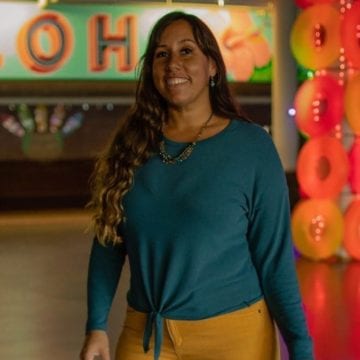It has been six months since Liz Ruiz saw families skating around the floor of Aloha Roller Rink.
The East San Jose-based business owner has watched other businesses reopen across the city without any idea about when she might be able to do the same, pay her employees or welcome back customers.
Ruiz had occupied her space at the Eastridge Center in San Jose for about two years and takes pride in being one of the only roller rinks in the area.
“It’s a type of activity that spans all generations,” Ruiz said. “Lots of parents grew up skating as kids and they’re excited to bring their kids because it’s nostalgic for them.”
East San Jose businesses, particularly those owned by women and minorities, are experiencing increased challenges under the continued shutdowns caused by COVID-19. Eastridge Center, a mainstay of the city’s east side, has been particularly hard hit.
“We’re a community center. The east side of San Jose is a tight community,” said Brian Fremgren, a leasing manager for Eastridge. He said the center, unlike a typical mall, offers unique services, such as the roller rink and a cat cafe. “We’re an integral part of the community.”
Only about three-quarters of the roughly 105 businesses in the center are open with limited capacity.
Ruiz’s roller rink has been relegated to the yellow phase of reopening in California, which means Santa Clara County as a whole needs to be deemed to have a low risk level for contracting COVID-19 in order to reopen.
To make it to this category, the county must have less than one new daily case per 100,000 residents, and a 2% positive test rate. Currently, the county is still in the red tier with the virus still posing a substantial threat, according to the state.
Who is most at risk
To be sure, East San Jose businesses aren’t alone in suffering. According to a new economic impact study from Yelp, San Jose had the fifth most permanent closures per 1,000 businesses in the U.S. since March 1, behind San Diego and Las Vegas.
Yelp recently added a feature to allow users to search for Latinx-owned businesses.
The report found metropolitan areas with higher rents have felt the impacts of the virus more acutely. Additionally, businesses that rely on their physical locations and require crowds of customers at that location have struggled with staying afloat.
“The county needs to do more to provide businesses financial assistance to get by,” said Eddie Truong, director of government and community relations for the Silicon Valley Organization. “We’re seeing this in real-time, every single day. Small businesses are shutting down.”
Truong said the county has not put enough proactive plans in place to help minority-owned and women-owned businesses, like Ruiz’s roller rink.
“We’re seeing the demise of minority-owned restaurants and other businesses,” Truong said. “They were under-resourced even before COVID-19. Unless there is immediate action from the county, this is just the tip of the iceberg.”
Dennis King, director of the Hispanic Chamber of Commerce Silicon Valley, said there is more at risk.
“The typical businesses owned and operated by ethnic minorities in this county, of course, are restaurants. And often they are more than a business,” King said. “They are a reflection of the communities that we serve. It adds a lot to vitality and they are a local neighborhood watering hole that people gather in.”
When people aren’t able to get together in these places, King said, “the nature of our lifestyle and the county will change.”
According to research from the Pew Research Center, in May about nearly 60% of Latinos said someone in their household had either lost a job or sustained a pay cut or both due to COVID-19.
The majority of Latinos surveyed by Pew, about 78%, said another economic relief bill would be needed in addition to the $2 trillion package passed in March.
Language barriers
In the beginning, Ruiz said, she thought she’d only be closed for a couple of months. She made some improvements for her rink space and even built a mini golf course for customers. It was a chance for her to catch up on projects she’d been meaning to work on, she said.
“This kind of flip-flopping (of reopening plans) is very difficult on a business owner,” Ruiz said. “Especially with how much money we put in, to open up for just a matter of days or weeks, just to get shut down again.”
Ruiz created plans to open at half capacity, built an online reservation system and complied with sanitation requirements for reopening. But that time hasn’t come.
Ruiz said she was frustrated with the state government when it switched to color-coded tiers with different types of businesses in each.
“Trying to get them to tell me where I was, where did I fit in, was difficult,” Ruiz said. “Was I athletics, family entertainment, amusement? They didn’t know.”
Ruiz called the state every day for clarification until she got an answer. While she said the county has done its part in disseminating information, the county is taking its cues from the state. “And if the state says roller skating is in the yellow category, there’s nothing I can do,” she added.
While she’s been able to navigate so far, Ruiz has seen other business owners, particularly those who don’t speak English fluently, struggle.
“I talked to a nail salon owner and she was confused,” Ruiz said. “She didn’t speak much English and she didn’t know what county she was in. She had tried to call the city (about whether she could open) and I had to tell her it was the county that decides.”
Ruiz said she took the woman’s phone and pulled up links for business loans she could apply for.
“She was so scared and didn’t know how to find the resources,” Ruiz said.
Contact Madelyn Reese at [email protected] and follow her @MadelynGReese





